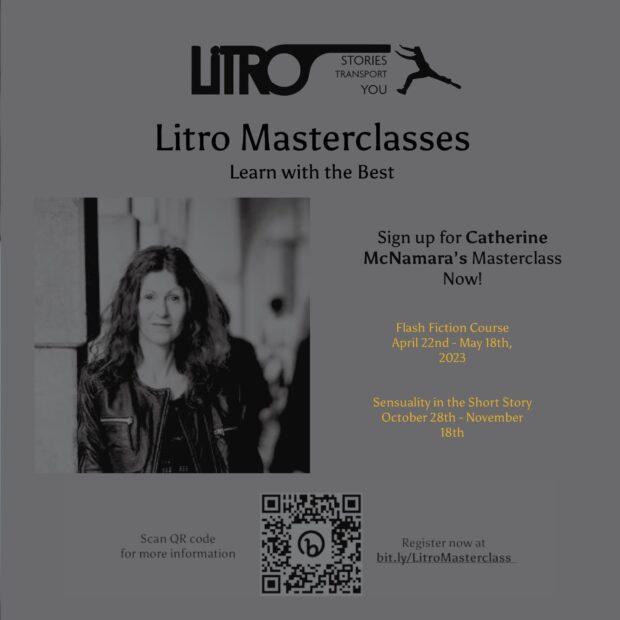You have no items in your cart. Want to get some nice things?
Go shopping
Our latest Flash of Inspiration interview is with Pauline Holdsworth, a writer and public radio producer in Toronto, Canada. One of our fiction editors, Farhana Khalique, caught up with Pauline to talk about her Best Small Fictions-nominated piece, “Demeter Stages an Intervention” and to discuss her writing process and tips.

Farhana: Hi Pauline, thanks so much for talking with us about your story, “Demeter Stages an Intervention”, which we published online in Litro USA in October. I love the form, the blend of the Classical and the modern, and the mother-daughter relationship in this unique and wonderful flash fiction. What was your inspiration for the piece?
Pauline: I have always been fascinated by the story of Demeter and Persephone. Some contemporary retellings of the relationship between Hades and Persphone write them as star-crossed lovers, but their dynamic has always struck me as an abusive relationship. It begins with abduction and coercion, there’s a thwarted attempt to leave, and a pattern of return. The cyclical nature of Peresphone’s return to the Underworld echoes the cyclical patterns of abuse – where there’s a honeymoon phase followed by rising tensions, an act of abuse, reconciliation and another honeymoon phase.
I wanted to explore what it would be like for Demeter if her daughter was going back to the Underworld of her own free will, because she believes Hades when he promises everything will be different this time. I also wanted to explore the complexity of agency here. Demeter badly wants to help her daughter leave for good, but even though she’s a god, she doesn’t have the power to dictate her daughter’s decisions. In some earlier drafts, I had Demeter consider keeping her daughter captive so she can’t go back to Hades – but then decide that she can’t violate her daughter’s agency and autonomy in that way. All she can do is keep trying different ways to show her daughter another life is possible.
Farhana: I’m intrigued by the order of the piece, both the plot-order and the time-order. The sense of the inevitable, but also the notes of hope weaved in throughout. Did you always plan for the story to unfold/re-fold in this way, or did you try other ways before you settled on this order?
Pauline: I first drafted this story during A SmokeLong Summer (a workshop run by the amazing flash fiction journal SmokeLong Quarterly!), during a month where we were challenged to experiment with time. For this piece, I was responding to a writing prompt by one of the tutors, Jiksun Cheung, to tell a story in reverse order. I wanted the tension between futility and hope to run through the piece, and decided to start in the moment where it becomes clear Persephone is about to go back to Hades, despite everything she’s told her mother about wanting to leave him. I liked the idea of moving backwards into moments of greater hope, culminating in the moment where Persephone first arrives and she and her mother hatch a plan to break the cycle.
I experimented with telling it in forward motion, but decided I liked starting with resignation and ending on a moment of possibility. Even though the beginning of the story suggests that this time, the cycle of abuse, departure and return will continue, Demeter’s final line “I’m a god. We’ll make new rules” suggests that someday, she and Persephone may find a way to break the rules of the cycle — and in doing so, change the rules of the story.
Farhana: What is the appeal of the short form for you? Do you have any favourite short stories/pieces that you’ve read in Litro?
Pauline: I love how short forms challenge us to jump right in to the world of the story. Recent flash pieces in Litro that do that beautifully include “Counting the Cloves” by Jane O’Sullivan and “Xanbir” by Uchechi Princewill. I love the musicality and rhythm in the opening of “Counting the Cloves”: “She grows up with apple pie and apple crumble and apple snow and cousins who threaten to lock her in the coolroom. She grows up with a father who sneers at anyone who doesn’t eat the core. (She doesn’t eat the core.)” In “Xanbir,” there is such a sense of confidence and daring in the voice that I immediately felt like I would follow the story wherever it went: “Us? We are dry bread in the mouth, rough on the tongue. Our imperfect faces are hidden away behind soot-stained xanbirs of wooly cloth that used to be white as the foot of the god we serve. They are grey now, speckled and mottled and rotting dry, and hiding our faces. Hiding our mouths and ears and noses and eyes from god’s world.”
Farhana: How has appearing in Litro and other literary magazines affected your writing/creative practice?
Pauline: I am relatively new to sending out work to literary magazines and find it both enormously surprising and enormously encouraging when a piece is picked up! I remember dropping my phone in delight when I got the acceptance email from Litro, and it helped bring me back to some other flash drafts I was stuck on and had put aside. A lot of writers recommend aiming for one hundred rejections a year, so I’ve tried to take that to heart, and to use both rejections and acceptances as fuel to keep writing and keep experimenting. I also created a rule where I’m allowed to buy a paperback book for every 10 rejections, and to buy a hardcover for every acceptance — which helps make both acceptances and rejections energizing and always brings me back to studying other people’s craft. After this acceptance, I picked up Kathryn Harlan’s astonishing short story collection Fruiting Bodies. Each story is a craft masterclass.
Farhana: Do you have a writing tip that you could share with our readers/future contributors?
Pauline: I have a busy day job and finding pockets of time to write is a perpetual challenge. One trick I use is to set a timer for 10 or 15 minutes and start writing without stopping. I often find that by the time the timer dings, I’ve written more than I thought was possible in such a short space. Sometimes it’s all I can fit in or have energy for, but often I find I want to keep writing after that, and that new ideas are starting to flow.
Farhana: Where can we read or buy more of your work and/or what else are you working on?
Pauline: Thank you! I’ve been lucky to have other flash fiction pieces appear in The Forge, The Penn Review, Gone Lawn and Vestal Review, and I have longer pieces forthcoming this year in Bat City Review and Orca. I’m also slowly working on a speculative/literary novel that explores some similar themes as “Demeter Stages an Intervention”: the cyclical nature of abuse, the complexity of agency, and how people begin to imagine their way out of a situation that feels set in stone.
Thanks again to Pauline for her generous and inspiring words! And if you’ve been inspired to write more short fiction and to submit your work for publication, sign up now for our new Masterclasses with our award-winning flash fiction editor and masterclasses tutor, Catherine McNamara! The first runs every Saturday from April 22-May 18, made up of 4 x 1-hour online workshops to hone your craft. Limited seats, so sign up now! Full details, here.


About Farhana Khalique
Farhana Khalique is a writer, voiceover artist and teacher from south-west London, UK. Her writing has appeared in Tales From the City, Best Small Fictions 2022, 100 Voices, and more. She is also a submissions editor at SmokeLong Quarterly and a fiction editor at Litro. Find Farhana @HanaKhalique and www.farhanakhalique.com.
- Web |
- More Posts(4)



